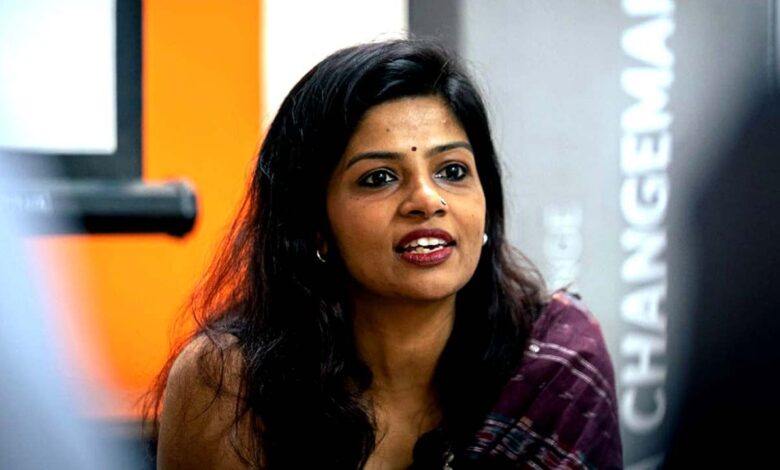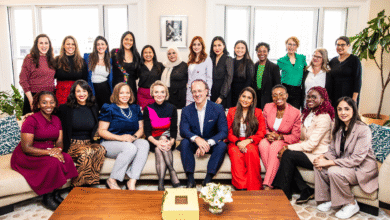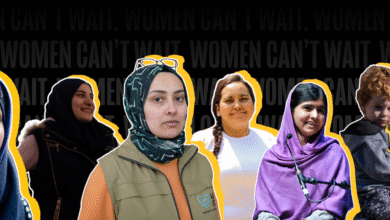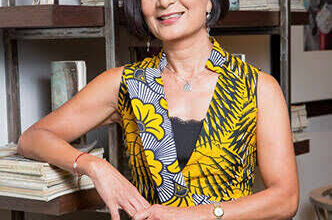On a mission to build a support network for Women Social Entrepreneurs and Changemakers

Bengaluru: Dr. Shruti Nair is the South Asia Leader at Ashoka Innovators for the Public, where she leads the organization’s overall strategy and team across the region. In this role, she is responsible for identifying and supporting Ashoka Fellows (leading social entrepreneurs), Ashoka Young Changemakers (teen changemakers), and institutional partners to advance Ashoka’s vision of an “Everyone a Changemaker” society. Shruti began her journey at Ashoka by designing impact strategies and went on to lead the Youth Years program before assuming leadership of the region in January 2024. Her work has been central to building a robust ecosystem that nurtures social entrepreneurs and changemakers across generations and sectors.
A recognized voice in the fields of social entrepreneurship, systems change, and women’s leadership, Shruti has been a featured speaker at numerous national and international forums. In 2020, she was named one of Femina Magazine’s #FAB50 influential women leaders in India. Shruti holds a Ph.D. in Media Studies from Florida State University and a Master’s degree in Mass Communication from Nanyang Technological University, Singapore.
Q: Thank you for joining us, Dr. Shruti Nair. Can you start by telling us a bit about yourself and how your career path has evolved over the years?
Shruti Nair: I have always been fascinated by stories, and throughout my career, I’ve tried to stay close to storytelling that creates impact. I began my career as a journalist, driven by the belief that there is always a story worth telling. After completing my Master’s degree from NTU in Singapore and working in the media and journalism space across two very different cultures, I decided to pivot toward communication for social change in order to do more meaningful work.
Before joining Ashoka, my work focused on helping social sector organizations measure their impact and communicate their stories effectively. I realized that the development sector is filled with powerful Stories of Change that often go unheard. At Ashoka, I have the incredible opportunity to support highly innovative social entrepreneurs and inspire society with the stories of our Ashoka Fellows and Ashoka Young Changemakers.
Currently, I serve as the South Asia Leader at Ashoka Innovators for the Public, a global network of leading social entrepreneurs and changemakers. Our work centers around identifying and supporting system-changing entrepreneurs who are solving society’s most pressing problems. In South Asia, I focus especially on cultivating ecosystems where women and girls can rise as changemakers—whether they’re launching social ventures, reimagining systems, or inspiring communities.
Q: What inspired you to focus on supporting female social entrepreneurs and changemakers?
Shruti Nair: Throughout my career, I’ve consistently championed equal representation for women and opportunities for young girls. Growing up, I was often discouraged from pursuing certain paths simply to fit into societal expectations and frameworks. Over the years, I’ve witnessed extraordinary leadership by women who are driving change—often quietly and without recognition. Despite facing deeply rooted structural and cultural barriers, they persist. That resilience and innovation inspired me to ask: What would it take for more women and girls to step into their power as changemakers? Supporting them isn’t just about equity—it’s about unlocking the full potential of our societies.
At Ashoka, we’ve made a conscious effort to support more women social entrepreneurs. I also believe it’s crucial for young girls to experience agency early in life and grow up practicing changemaking skills. This lays the foundation for more women innovators and social entrepreneurs in the future. When girls are empowered early on, it sets off a chain reaction—improving their problem-solving abilities, increasing workforce participation, and strengthening democratic engagement.
It’s a ripple effect. Girls growing up as changemakers don’t just change their own lives—they uplift entire communities and societies. My work at Ashoka allows me to inspire others to see the potential of girls growing up as changemakers and the transformative role this plays in building future women leaders.
Q: What are the biggest challenges women and girls face in becoming social entrepreneurs and changemakers?
Shruti Nair: Women and girls face a wide range of systemic and cultural barriers in their journey to becoming changemakers. One of the key challenges is limited access to resources and networks. Many women-led initiatives are underfunded. In addition to resource constraints, entrenched social norms continue to dictate who gets to lead and who remains in the background. Girls are often not encouraged to see themselves as problem-solvers or leaders, and caregiving responsibilities disproportionately fall on women, limiting the time and space they have to pursue entrepreneurial goals. We need to shift this narrative from the grassroots level and create environments that validate and support girls’ ambitions from a young age.
Mentorship, inclusive training, and strong networks are also often out of reach for women, particularly those from rural or underserved communities. Being part of the right networks is crucial—not just for funding but also for encouragement, guidance, and collaborative opportunities. Without champions or community support, many women experience isolation and self-doubt.
Other challenges include safety and mobility, especially in rural areas, which restrict women’s ability to travel, network, and scale their ideas. Years of systemic underrepresentation also breed internalized bias and diminished confidence, making it harder for women to claim leadership roles. Addressing these barriers requires both structural reforms and cultural transformation—through gender-sensitive policies, accessible capital, early exposure to changemaking, and strong peer-support networks that help women and girls lead with confidence and authenticity.
Q: How is your work with Ashoka supporting this shift in South Asia? Can you share a story of a female social entrepreneur who particularly inspired you?
Shruti Nair: Our goal is to inspire everyone to create an “Everyone a Changemaker” society—and that starts with investing in those who are already leading change. We identify and support Ashoka Fellows—many of whom are women leading systemic change in education, healthcare, gender equity, and climate action. We also run programs like Ashoka Young Changemakers, which encourage young people—especially girls—to step into leadership roles early in life. Through mentorship, visibility, and ecosystem-building, we aim to make changemaking the norm in our society.
Every woman entrepreneur has an inspiring story, but let me share the journey of someone we recently welcomed into the Ashoka Fellowship community—Prachi Deo. Her story is deeply personal and incredibly powerful. It begins with her elder brother, who was born with Down syndrome. Growing up as his younger sister, Prachi witnessed the unequal opportunities and immense challenges her brother and family faced. Her parents’ tireless efforts to secure appropriate care, therapies, and education for him opened her eyes to the glaring systemic gaps in support.
As Prachi became her brother’s primary caregiver, she gained intimate insight into the emotional, social, and practical struggles families endure—especially those in smaller towns and low-income communities, where stigma is strong and resources are scarce. Motivated to transform this reality, she drew upon her engineering background and experience at Microsoft and TCS to create a meaningful solution.
In 2015, Prachi founded Nayi Disha, a tech-driven nonprofit that acts as a lifelong support system for families affected by developmental disabilities. Nayi Disha is not just an organization—it’s a digital knowledge hub, a community platform, and a helpline. It bridges the information divide and offers families access to practical, easy-to-understand, and credible resources—from healthcare and legal rights to education and inclusive living.
Under her leadership, Nayi Disha has become a lifeline for hundreds of thousands of families across India. It empowers caregivers, spreads awareness, and creates a space where no one feels alone in their journey.
Q: What is your vision for the next few years of your work in fostering social change?
Shruti Nair: My vision is to see India evolve into a nation where changemaking is truly democratized—a society where every individual, regardless of their background or circumstances, is empowered to lead positive change. I want to see greater representation of women Ashoka Fellows and amplify innovations led by girls. Diversity in leadership is critical to addressing the complex, layered challenges our society faces.
Beyond individual success stories, I aim to build strong, interconnected ecosystems that not only support changemakers but also help sustain their work over time.
Ultimately, my goal is for changemaking to move from being seen as extraordinary to being an expected, everyday practice. It should be embedded in our culture. This means creating an environment where every person feels both capable of and responsible for making a difference. We must ensure that every member of our core and extended communities understands, owns, commits to, and excels at championing the Everyone a Changemaker culture.
Q: Finally, what advice would you give to young girls who want to make a difference but aren’t sure where to start?
Shruti Nair: Give yourself permission to begin—right now. Start with what moves you: what breaks your heart and what gives you hope. Every changemaker I’ve met started with a small step, often in their own neighbourhood or community.
Seek mentors, ask questions, and don’t be afraid to take bold steps. Your perspective matters. Your story matters. The world doesn’t just need generic leaders—it needs your leadership.
Those who embrace the power of giving often lead the most meaningful lives. Entrepreneurship, at its core, is about empowering others. When we help each other become the best changemakers we can be, we collectively build a better, more compassionate world.
Source link




